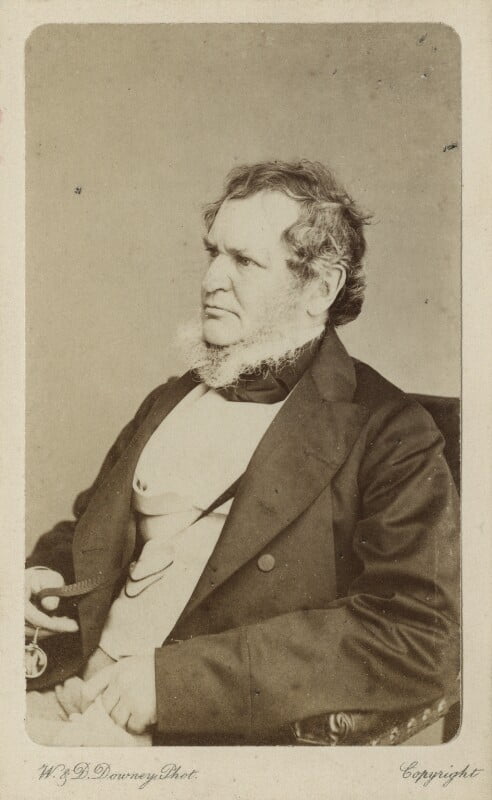Edward Smith-Stanley, 14th Earl of Derby
Conservative Party
Image credit: Edward Stanley, 14th Earl of Derby, W & D Downey, 1865. © National Portrait Gallery, London licensed under CC BY-NC-ND 3.0
Edward Smith-Stanley, 14th Earl of Derby
I intend to maintain inviolate the great institutions of the country: … the prerogatives of the Crown, the independence and hereditary character of your Lordships’ House and the rights of the people…
Conservative Party
February 1852 - December 1852
23 Feb 1852 - 17 Dec 1852
|February 1858 - June 1859
|20 Feb 1858 - 11 Jun 1859
June 1866 - February 1868
28 Jun 1866 - 25 Feb 1868

Image credit: Edward Stanley, 14th Earl of Derby, W & D Downey, 1865. © National Portrait Gallery, London licensed under CC BY-NC-ND 3.0
Key Facts
Tenure dates
23 Feb 1852 - 17 Dec 1852
20 Feb 1858 - 11 Jun 1859
28 Jun 1866 - 25 Feb 1868
Length of tenures
3 years, 280 days
Party
Conservative Party
Spouse
Emma Bootle-Wilbraham
Born
29 Mar 1799
Birth place
Knowsley Hall, Knowsley, Lancashire, England
Died
23 Oct 1869 (aged 70 years)
About The Earl of Derby
Lord Derby’s reputation is that of the ‘forgotten Prime Minister’. He was an important figure in Victorian politics, and served as Prime Minister thrice, albeit briefly every time, and never with a Parliamentary majority. He worked well with the fiery Benjamin Disraeli and passed some important legislation. He was the first person to be Prime Minister on three separate occasions.
Edward Stanley was born in 1799. He was educated at Eton and Christ Church, Oxford (though did not earn a degree).
In 1822, he entered Parliament as the MP for Stockbridge as a Whig, a ‘rotten borough’ purchased by his grandfather. He earned a reputation as one of the finest speakers in the Commons and was able to speak with authority on a wide variety of subjects.
When Lord Grey came to power in 1830, Stanley became Chief Secretary to Ireland, moving to Secretary of War and the Colonies in 1833. That year, it was Stanley who introduced the first of five resolutions calling for the emancipation of slaves in the British Empire within one year and who oversaw the passing of the Abolition of Slavery Bill. He also provided formidable speeches in support of the Reform Bill (despite somewhat lukewarm personal feelings towards the measure).
However, he resigned from the government in 1834 over reform of the Church of Ireland. He formed a moderate Parliamentary group (called the ‘Derby Dilly’ by one critic), which is best characterised as a group of dissident Whigs. In Parliament, he started to become much closer to the Tories. When Peel won the election in 1841, Stanley joined the government as secretary for War and the Colonies.
In 1844, he accepted a peerage, becoming Lord Stanley, and sitting in the Lords (he became Lord Derby in 1851, upon the death of his father). In December 1845, he resigned from Peel’s government in opposition to the abolition of the Corn Laws. Stanley then opposed the measures in the House of Lords, losing the fight, but becoming the de facto leader of the Conservative peers. From 1846, he was the Leader of the Conservative Party and Leader of the Conservatives in the House of Lords, only resigning from these roles in 1868. Even today, he holds the record as the longest serving Leader of the Conservative Party.
Derby was Prime Minister three times over the two decades that followed (1852, 1858-59, 1866-68). Each premiership was relatively brief and at no point did he command a majority in the House of Commons. He worked with the Conservative leader in the Commons, Benjamin Disraeli, who played a key role in each of his three governments.
Derby’s most important political achievement was the passing of the 1867 Reform Act, which doubled size of the franchise. Other important pieces of legislation included the India Bill of 1858, which ended Company Rule in India, and reestablished the territory as a Crown Colony, and the Jews Relief Act of 1858, which ended the disbarment of Jews to sit in Parliament.
Derby married Emma Caroline Bootle-Wilbraham in 1825. They had three children.
Derby died in 1869.
Collections & Content
Andrew Bonar Law
Bonar Law was the shortest serving Prime Minister of the 20th Century, being in office for just 209 days. He was gravely ill when he t...
The Earl of Rosebery
Lord Rosebery was Gladstone’s successor and the most recent Prime Minister whose entire parliamentary career...
Arthur James Balfour
Arthur Balfour was Salisbury’s successor. He had a reputation as a good parliamentarian, a capable minister, and an excellent ta...
The Duke of Wellington
Wellington is a Prime Minister who is today largely remembered for achievements unrelated to his premiership. ...
The Duke of Grafton
The Duke of Grafton believed, according to Horace Walpole, that ‘the world should be postponed to a whore and a...
Benjamin Disraeli
Charming, brilliant, witty, visionary, colourful, and unconventional, Benjamin Disraeli (nicknamed ‘Dizzy’) was one of the greate...
Boris Johnson
Boris Johnson is one of the most charismatic and controversial politicians of the modern era. To supporters, he was an authentic voice wh...
The Earl Grey
Earl Grey was the great aristocratic reformer. His government passed the ‘Great Reform Act of 1832’, ending an entire e...


